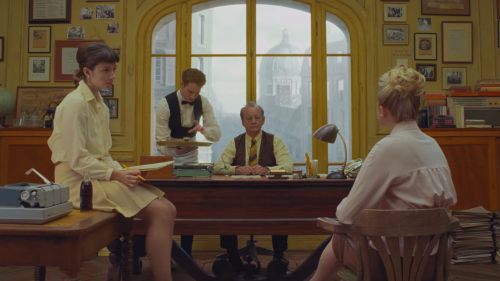MOONRISE KINGDOM: Perfection Has Nothing On Happiness
In honor of Ingrid Goes West, Alamo Drafthouse is running a series of films picked by Ingrid director Matt Spicer called Tales of the Obsessed. You can check out the lineup here. And get your Ingrid Goes West tickets here!
The island of New Penzance, where most of Wes Anderson’s 2012 picture Moonrise Kingdom is set, is simultaneously lovely and horrible. Why’s it lovely? It’s indisputably beautiful. Nature has largely been left to its own devices, and the places the island’s community have carved out for themselves are still more green than not. It’s an island filled with long-lived trees, cliffs formed over generations and tiny, isolated beaches. And in theory, it’s a great place to live. It’s small enough for everyone to know everyone else, and big enough for everyone to have their own space. New Penzance is a place where, if someone were so inclined, they could build a pretty great life.
But that’s where things start to turn sour. Why is New Penzance horrible, at least at the beginning of Moonrise Kingdom? Because, for many who live there, especially the island’s adults, pretty great isn’t enough. They need perfection. Not the kind of perfection that hits unexpectedly and makes a moment a permanent satisfaction. No, they seek to live lives they’ve idealized to the point of impossibility. They want to be the ideal family, the greatest Khaki Scout leader, the coolest scout troop. Because of that, they either miss where things are going wrong entirely or refuse to confront the problems that naturally come with their being living, breathing people. When they do respond, they opt for the most heavy-handed solution possible. It’s a pretty crummy place to live, especially for bright, lonely, odd kids who’ve never been able to fit into the molds everyone else desperately wants to live in.
So, what do Sam Shakusky (Jared Gilman) and Suzy Bishop (Kara Hayward), the kids in question, do? They leave. Sam’s fellow Khaki Scouts (including Lucas Hedges, later of Manchester by the Sea) have singled him out for torment for reasons they themselves ultimately admit are, at best, absurdly petty. Ward, Sam’s Scoutmaster (Edward Norton) is a milquetoast who fancies himself a lion of a man. He means well, but he keeps trying to be the spitting image of Harvey Keitel’s macho Scout Commander, and in so doing he only succeeds in being ineffectual. Suzy’s parents (Frances McDormand and Bill Murray) refuse to talk to her about her anger issues or their own badly strained marriage. They hide the book they’ve acquired on working with a troubled child and prefer to avoid each other as often as possible. Her younger brothers are, to the last, obnoxious little kids. When Sam and Suzy met, they recognized in each other a kindred spirit. That recognition leads to correspondence. That correspondence leads to their falling for each other, and in the spirit of other bright, lonely kids before them, deciding to run away together. They make for one of New Penzance’s isolated coves, with a lovely, naïve dream of building a life together in their own little world.
The crucial difference between Sam and Suzy’s fantasy of a life in Moonrise Kingdom (their name for the tidal inlet) and the impossible dreams of the grown-ups in their lives is that the kids aren’t trying to be anyone but who they are. They’re starting to come of age and struggling with the ways the world is getting bigger. They have little use for the pretentions and foibles of their parents and guardians. When Suzy is unhappy, she lets herself be unhappy. Her father, by contrast, tries and fails to chop down a tree while shirtless and chugging wine straight from the bottle. Her mother carries on an affair with the lonely, good-hearted Captain Sharp, (Bruce Willis, in one of his best recent performances), but hesitates to acknowledge it even when her daughter directly confronts her about it. When Ward tries to comfort Sam after he and Suzy are caught and separated, Sam has little patience for his former Scoutmaster’s fumbling efforts. Ward knew that Sam was unpopular with his fellow scouts, but he did nothing to alleviate his obvious unhappiness beyond acting like there was nothing wrong.
All Sam and Suzy want is to be together and be happy. Their attempt to make that desire a reality, in unintentional conjunction with the devastating storm that strikes New Penzance in Moonrise Kingdom’s last act, brings about seismic positive change on the island. Sam was seen primarily as an irritant to his scout troop and Suzy’s parents thought she was a problem they weren’t equipped to solve, but their presence was taken for granted as part of the status quo. The Bishops would continue their distant, unhappy marriage. Scoutmaster Ward would keep trying to be someone he wasn’t to his own detriment. Troop 55 would continue to see Sam’s status as an orphan as proof that he was some kind of serious problem. When Sam and Suzy flee, they shatter the island’s staid norms. And when the adults catch them, separate them and try to understand why the two ran away, it quickly becomes clear that the previous norms can no longer be applied. Troop 55, minus Hedges’ proudly nasty jerk, realize that their dislike of Sam is irrational and cruel. The Bishops have what is strongly implied to be their first real conversation in years, and confront the fact that they’ve been failing their daughter as parents. Ward, after a disenchanting meeting with the Scout Commander he’d so idolized, steps up in a crisis and comes into his own as a Scoutmaster. Sharp, who’d devoted his adult life to lonely melancholy, sees himself in Sam and resolves that the boy will have a happier life than he’s had. By letting go of what they’d previously insisted had to be, everyone in Moonrise Kingdom closes out the story happier than they were. They, and New Penzance, are better for it.
Get your Tales of the Obsessed tickets here and your Ingrid Goes West tickets here!



